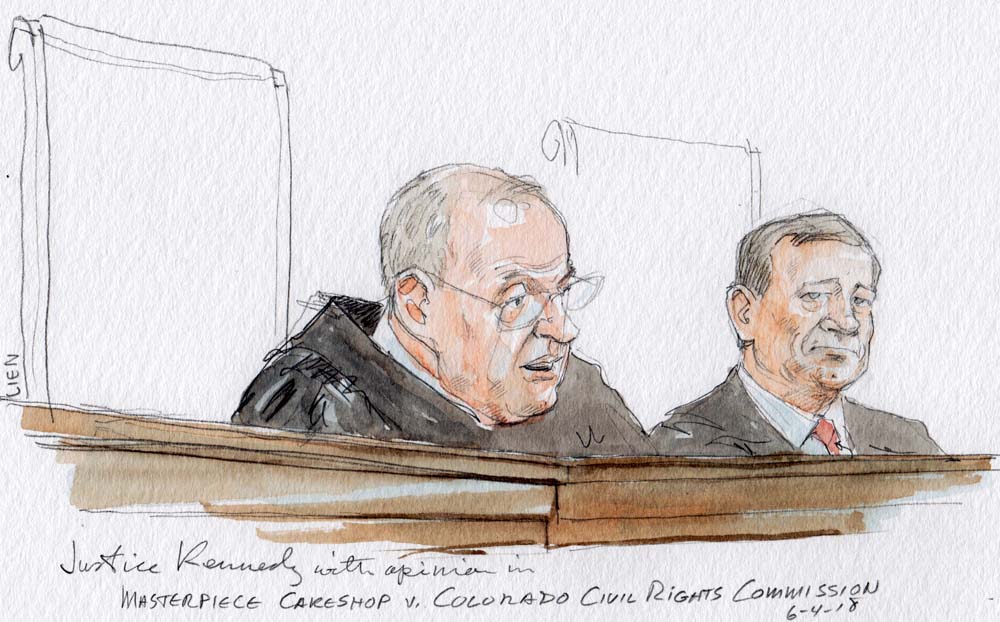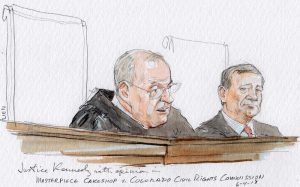Opinion analysis: Court rules (narrowly) for baker in same-sex-wedding-cake case [Updated]

on Jun 4, 2018 at 4:07 pm

[NOTE: This post was updated at 2:17 p.m. after its original publication at 12:04 p.m.]
The Supreme Court ruled today in favor of Jack Phillips, a Colorado baker who refused to make a custom cake for a same-sex couple because he believed that doing so would violate his religious beliefs. This was one of the most anticipated decisions of the term, and it was relatively narrow: Although Phillips prevailed today, the opinion by Justice Anthony Kennedy rested largely on the majority’s conclusion that the Colorado administrative agency that ruled against Phillips treated him unfairly by being too hostile to his sincere religious beliefs. The opinion seemed to leave open the possibility that, in a future case, a service provider’s sincere religious beliefs might have to yield to the state’s interest in protecting the rights of same-sex couples, and the majority did not rule at all on one of the central arguments in the case – whether compelling Phillips to bake a cake for a same-sex couple would violate his right to freedom of speech.
The dispute that led to today’s ruling began back in 2012, when Charlie Craig and David Mullins went to Masterpiece Cakeshop, a bakery outside Denver, to order a cake to celebrate their upcoming wedding. But Jack Phillips, the owner of the bakery and a devout Christian, refused the couple’s request because he is not willing to design custom cakes that conflict with his religious beliefs. A Colorado civil-rights agency ruled that Phillips had violated the state’s antidiscrimination laws and told him that, if he wanted to make cakes for opposite-sex weddings, he would have to do the same for same-sex weddings. After a Colorado court upheld that ruling, Phillips went to the U.S. Supreme Court last year.
Almost six months to the day after the oral argument, the justices today handed Phillips a victory, even if not necessarily the ruling that he and his supporters had hoped for. Kennedy, the author of some of the court’s most important gay-rights rulings, began by explaining that the case involved a conflict between two important principles. On the one hand, society has recognized that “gay persons and gay couples cannot be treated as social outcasts or as inferior in dignity and worth,” and their rights are protected by the Constitution. On the other hand, “the religious and philosophical objections to gay marriage are protected views and in some instances protected forms of expression.” But even if those objections are protected, Kennedy explained, the Supreme Court’s precedents make clear that in some cases the right to the free exercise of religion is not absolute and can instead be limited by neutral laws that apply to everyone. It is clear, Kennedy continued, that in at least some scenarios sincerely held religious beliefs can trump such laws – for example, a member of the clergy who objects to same-sex marriage cannot be required to perform such marriages. But at the same time, Kennedy explained, the exception cannot be allowed to swallow the rule, with the result that “a long list” of people would be allowed to refuse to provide services for same-sex marriages.
In this case, Kennedy suggested, Phillips found himself on the horns of a dilemma: Because he regarded his craft as one in which he uses “his artistic skills to make an expressive statement,” making a cake for a same-sex couple would require him to convey a message that is inconsistent with his religious beliefs. This dilemma was further complicated, Kennedy noted, by the “background of legal principles and administration of the law in Colorado at that time”: Colorado did not recognize same-sex marriages, and state law also gave Phillips “some latitude to decline to create specific messages the storekeeper considered offensive.”
But the critical question of when and how Phillips’ right to exercise his religion can be limited had to be determined, Kennedy emphasized, in a proceeding that was not tainted by hostility to religion. Here, Kennedy observed, the “neutral and respectful consideration to which Phillips was entitled was compromised” by comments by members of the Colorado Civil Rights Commission. At one hearing, Kennedy stressed, commissioners repeatedly “endorsed the view that religious beliefs cannot legitimately be carried into the public sphere or commercial domain, implying that religious beliefs and persons are less than fully welcome in Colorado’s business community.” And at a later meeting, Kennedy pointed out, one commissioner “even went so far as to compare Phillips’ invocation of his sincerely held religious beliefs to defenses of slavery and the Holocaust.” “This sentiment,” Kennedy admonished, “is inappropriate for a Commission charged with the solemn responsibility of fair and neutral enforcement of Colorado’s anti-discrimination law—a law that protects discrimination on the basis of religion as well as sexual orientation.” Moreover, Kennedy added, the commission’s treatment of Phillips’ religious objections was at odds with its rulings in the cases of bakers who refused to create cakes “with images that conveyed disapproval of same-sex marriage.”
Here, Kennedy wrote, Phillips “was entitled to a neutral decisionmaker who would give full and fair consideration to his religious objection as he sought to assert it in all of the circumstances in which this case was presented, considered, and decided.” Because he did not have such a proceeding, the court concluded, the commission’s order – which, among other things, required Phillips to sell same-sex couples wedding cakes or anything else that he would sell to opposite-sex couples and mandated remedial training and compliance reports – “must be set aside.”
But the majority left open the possibility that a future case could come out differently, particularly if the decisionmaker in the case considered religious objections neutrally and fairly. Other cases, the majority emphasized, “must await further elaboration in the courts, all in the context of recognizing that these disputes must be resolved with tolerance, without undue disrespect to sincere religious beliefs, and without subjecting gay persons to indignities when they seek goods and services in an open market.” Justice Ruth Bader Ginsburg dissented from the court’s ruling, in an opinion joined only by Justice Sonia Sotomayor. Ginsburg stressed that there “is much in the Court’s opinion with which I agree,” but she “strongly” disagreed with the idea that the same-sex couple “should lose this case.” In particular, she argued, neither the commissioners’ statements about religion nor the commission’s disparate treatment of other bakers who refused to make cakes disapproving of same-sex marriage justified a ruling in favor of Phillips.
Justice Elena Kagan joined Kennedy’s opinion for the court, but she also filed a concurring opinion, which was joined by Justice Stephen Breyer. Kagan agreed with the Kennedy opinion that the Colorado Civil Rights Commission had not given Phillips and his religious objections the kind of “neutral and respectful consideration” to which he was entitled. But she would not give any weight to the commission’s treatment of bakers who had declined to make cakes bearing messages that disparaged same-sex marriage, because in her view the latter had not violated the Colorado law at the heart of Phillips’ case.
In a concurring opinion joined by Justice Samuel Alito, Justice Neil Gorsuch pushed back against both the Ginsburg and the Kagan opinions. In his view, the different bakers’ cases – refusing to make cakes for a same-sex marriage and refusing to make cakes disparaging same-sex marriage – were, from a legal perspective, similar, and the commission was wrong to treat them differently just because it regarded Phillips’ beliefs as “offensive.” Using strong language, Gorsuch emphasized that, in the United States, “the place of secular officials isn’t to sit in judgment of religious beliefs, but only to protect their free exercise. Just as it is the ‘proudest boast of our free speech jurisprudence’ that we protect speech that we hate, it must be the proudest boast of our free exercise jurisprudence that we protect religious beliefs that we find offensive.”
Justice Clarence Thomas wrote separately, in an opinion joined by Gorsuch, to address an issue that the court did not decide: whether an order mandating that Phillips bake cakes for same-sex weddings violates his right to free speech. In Thomas’ view, Phillips’ creation of custom wedding cakes is exactly the kind of “expressive” conduct protected by the First Amendment. Requiring Phillips to make such cakes for same-sex marriage, even when it will convey a message that “he believes his faith forbids,” violates his First Amendment rights.
“Because the Court’s decision vindicates Phillips’ right to free exercise” of his religion, Thomas concluded, “it seems that religious liberty has lived to fight another day.” Today’s ruling, however, casts at least some doubt on how easy it will be for others in Phillips’ position to prevail going forward, given the majority’s emphasis on the unsettled state of the same-sex marriage laws when Craig and Mullins came to Phillips in 2012 and the open hostility displayed by the Colorado Civil Rights Commission at Phillips’ hearings. Thomas’ discussion of Phillips’ free-speech claim seemed to acknowledge this, with his observation that, “in future cases, the freedom of speech could be essential to preventing” the Supreme Court’s 2015 decision in Obergefell v. Hodges, recognizing a constitutional right to same-sex marriage, from being used to “portray everyone who does not” agree with that ruling “as bigoted and unentitled to express a different view.” In short, today’s ruling seemed to leave open as least as many questions as it resolved. The only thing we can be sure of is that these issues will return to the courts, and in all likelihood the Supreme Court, before long.
This post was originally published at Howe on the Court.



